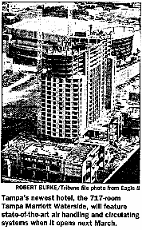Some local hotels invest in making rooms more breathable, including wallpaper that helps prevent mildew.
A Wall Street Journal report
“I think the capacity to be able to evaluate and respond to indoor air quality concerns is of recent vintage, about the last decade,” he said.

“As more has been learned, the industry has been learned, the industry has been sought to be responsive and keep up with the trends.”
The Hilton Tampa Airport Westshore recently changed the wallpaper in all 238 rooms, installing a breathable vinyl paper, said engineering director Ray Fowler.
The paper costs a bit more than the air tight variety, Fowler said, but it is perforated to allow air in and out. Also, the wallpaper glue contains mildew killing chemical.
The hotel maintains a proper humidity level in the rooms and proper turnover of air. Fresh air enters under the door and is blown out through an exhaust system in the bathroom, he said.
Tampa’s newest hotel, the 717-room Tampa Marriot Waterside, will feature breathable wallpaper when it opens next March, said marketing director Gary Hughes.
And the company has invested quite a bit of money in making sure the air handling and circulating systems are every bit as state-of-the-art as the hotels telecommunications features, he said.
Neicei Degen walked into her hotel room at Hilton Washington & Towers looking forward to a relaxing week in the capital. She walked right out.
The problem, the Peabody, Mass., administrator says, wasn’t the glitzy décor or the limited view. It was the air, which she describes as a musty blend of stale air and cleaning fumes.
“I didn’t know what the blazes hit me,” says Degen, who is chemically sensitive. “It was a beautiful hotel room, but I had to get out of there.”
Degen learned something most travelers never suspect: Hotels might add Internet lines and spruce up suites, but air quality isn’t getting a much attention.
Experts say it may sometimes cause everything from headaches to fatigue.
Clinics from San Francisco to Boston specializing in travel health say almost 25 percent of patients who are frequent hotel guests complain about air quality.
At Travel Health Services, a clinic in Manhattan, patient complaints range from kitchen fumes to bad ventilation, says the medical director, Bradley Connor. He adds the number is growing. It’s such an issue that some companies – and even a few travelers – are hiring environmental consultants to check out hotels before they check in.
The problems range from old air- conditioning systems to airtight wallpaper that designers love, but building engineers hate. (They say as good as it looks, its even better at growing mildew.) And that’s not to mention paint fumes, cleaning solvents and deodorizers brewing in a typical room.
The outside air has its own problems, from pollution to pollen, that circulate through any hotel. Rick Layton, chief executive officer at Servidyne Systems Inc., a building-engineering company in Atlanta, estimates that only about half of all hotels provide air that’s adequately clean.
“A lot of hotels are just afraid to deal with it,” he says, adding that telltale signs range from the smell of mold to stale air.
Even many hotel chains say indoor air quality deserves more attention, especially in light of so-called sick-building syndrome. Some prominent chains are improving maintenance schedules on air-conditioning systems and using more environmentally friendly cleaning products. Others are ripping out wallpaper that can produce too much mold.
In the Tampa Bay area, many hotels have comprehensive engineering departments in charge of dealing with indoor air quality, said Bob Morrison, executive director of Hillsborough County Hotel and Motel Association.
